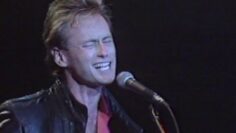ABBA – Waterloo
“Waterloo” – Single by ABBA from the album Waterloo
B-side “Honey, Honey (Svensk Version)” (Swedish-language release) / “Watch Out” (English-language release)
Released 4 March 1974
Label Polar; Epic; Polydor; Atlantic
Composer(s)
Benny Andersson Björn Ulvaeus
Lyricist Stikkan Anderson
Producers Benny Andersson and Björn Ulvaeus
Charted No.6 in US; No.1 in UK; No.1 in West Germany; No.3 in Sweden; No.4 in Australia; No.7 in Canada; No.1 in Denmark; No.1 in Finland; No.1 in Norway.
On 10 February 1973, ABBA as “Agnetha, Anni-Frid, Björn and Benny” competed with “Ring Ring” in the 13th edition of the Melodifestivalen, placing third. After this good position, Benny Andersson and Björn Ulvaeus composed the music, and Stikkan Anderson wrote the lyrics, of “Waterloo” specifically for the group to enter in the 14th edition of the Melodifestivalen.
Recording of the song commenced in 1973, with instrumental backing from Janne Schaffer (who came up with the main guitar and bass parts), Rutger Gunnarsson, and Ola Brunkert. The song’s production style was influenced by Phil Spector’s “Wall of Sound”: prior to recording “Ring Ring”, engineer Michael B. Tretow had read Richard Williams’s book Out of His Head: The Sound of Phil Spector, which inspired him to layer multiple instrumental overdubs on the band’s recordings, becoming an integral part of ABBA’s sound. Furthermore, ABBA had also originally cited the song “See My Baby Jive”, by English glam rock band Wizzard, as a major influence (it was produced in the same style and has a similar structure); in the wake of their Eurovision victory, they were quoted as saying that it would not surprise them if artists such as Wizzard would consider entering the Eurovision in the future.
On 9 February 1974, ABBA competed with the Swedish-language version of “Waterloo” in the Melodifestivalen final. The song won the competition with 302 points, beating the 211 points of the runner-up. As that Melodifestivalen was organised by Sveriges Radio (SR) to select its song and performer for the 19th edition of the Eurovision Song Contest, the song became the Swedish entrant, and ABBA the performers, for Eurovision.
On 6 April 1974, the Eurovision Song Contest was held at The Dome in Brighton hosted by the British Broadcasting Corporation (BBC), and broadcast live throughout the continent. ABBA performed the English-language version of “Waterloo” eighth on the evening, following “Generacija ’42” by Korni Grupa from Yugoslavia and preceding “Bye Bye I Love You” by Ireen Sheer from Luxembourg. Sven-Olof Walldoff, dressed as Napoleon, conducted the event’s live orchestra in the performances of the Swedish entry.
At the end of voting, the song scored 24 points placing first and winning the contest, beating runner-up “Sì” by Gigliola Cinquetti from Italy by six points.
The song differed from the standard “dramatic ballad” tradition at the contest by its flavour and rhythm, as well as by its performance. ABBA gave the audience something that had rarely been seen before in Eurovision: flashy costumes (including silver platform boots), a catchy uptempo song and simple choreography. It was the first winning entry in a language other than that of their home country; prior to 1973, all Eurovision singers had been required to sing in their country’s native tongue, a restriction that was lifted briefly for the contests between 1973 and 1976 (thus allowing “Waterloo” to be sung in English), then reinstated before ultimately being removed again in 1999. Compared to later ABBA releases, the singers’ Swedish accents are decidedly more pronounced in “Waterloo”.




